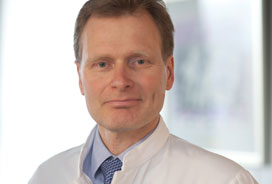Our diagnostic examination methods in endocrinology
Depending on the clinical picture, targeted treatment is used:
Our examination methods emphasise the importance of checking the various hormonal disorders. As a rule, blood and/or urine are analysed in our specialist laboratory. In some cases, the patient is also given substances that have a stimulating or inhibiting effect on the hormonal control circuits, and imaging procedures are also used to better clarify the individual clinical pictures. Sonography takes centre stage here. If necessary, this is supplemented by scintigraphy, X-rays or computer tomography or magnetic resonance imaging.When diagnosing a bone density deficiency (osteoporosis), a bone density measurement can be carried out in our practice and the bone-building and bone-degrading metabolic parameters can then be determined in the blood and urine. Depending on the results of the examination, we discuss the necessary and optimal therapies with our patients.
Bone density measurement can be used to assess the stability of the bone and the risk of fracture. The internationally recommended procedure for this is Dexa osteodensitometry. We can perform this procedure in our practice with a modern, fast and low-radiation device and offer it to you.
The target group includes women in/after the menopause, patients before and during treatment with cortisone, patients with bone fractures, patients with allergies and intolerances to dairy products or intestinal diseases, cases of osteoporosis in the family and for monitoring the progress of previously diagnosed osteoporosis. Patients with inflammatory rheumatic diseases in particular are more likely to suffer from osteoporosis
The prostate-specific antigen is a tumour marker and can be used to identify cancer of the prostate (prostate gland) in men at an early stage. Annual checks are advisable. The ratio of free PSA to total PSA can give an indication of the probability of a malignant change in the prostate. If you would like a determination of PSA, free PSA or other tumour markers, please contact us.
If you would like to have female or male sex hormones or their precursors such as DHEA determined as an individual health service, we can determine these for you in our laboratory.
Monitoring blood levels of lipid and carbohydrate metabolism is important in order to recognise patients at risk of arteriosclerosis and diabetes mellitus at an early stage. It is now known that patients with inflammatory rheumatic diseases, in particular patients with rheumatoid arthritis, are just as likely to suffer a heart attack as patients with diabetes. It is therefore important to recognise risk factors in lipometabolism and sugar metabolism.
In our laboratory, we can determine subgroups of blood lipids (e.g. ‘good’ and ‘bad’ cholesterol) as well as sugar metabolism parameters (HbA1c and adiponectin) in order to monitor your current metabolic situation and assess your risk of developing such diseases.
If you are interested in finding out about your metabolic situation outside the scope of the checks available under the statutory health insurance scheme, please contact the practice team.
